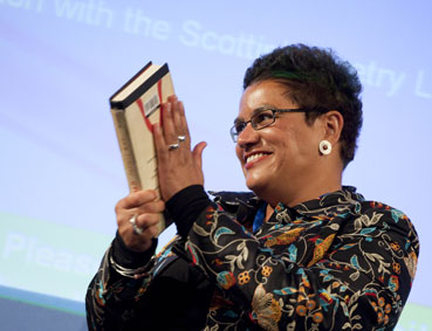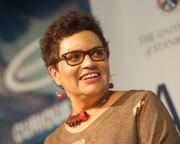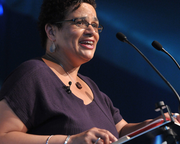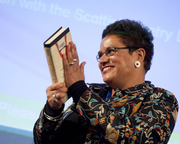Kindred
By Jackie Kay
We have commissioned a new piece of writing from fifty leading authors on the theme of 'Elsewhere' - read on for Jackie Kay's contribution.
Being dead is not at all like I imagined when I was a kid. I imagined the dead would be pale and quiet, and that if they walked at all, they’d walk like zombies, in shuffling slippers, and if they talked at all, they’d whisper and have gravelly rasping voices like the voice of what’s his face in Oliver, the guy that teaches them all to steal. It’s gone. Not the Artful Dodger and not Bill Sykes, but... never mind. It’s not the end of the world forgetting bits and pieces, but when I was alive I was a mine of information. People used to say that to me: Martha, you’re a mine of information. Much sought after, me, for the pub quiz! And now that I’m dead, I’m still being headhunted which is kind of funny. People come to me to ask loaded questions. Things like: how long will it be before I disintegrate? How long before I start to smell really bad? How long before I get to contact my family? I tell it like it is; I say, you’re already disintegrated, mate, and you are a bit whiffy, darling, and you don’t get to contact your family, but they can get in touch with you, if they make a little effort, sweetheart. (We dead do have a weakness for those terms of endearment.) What we’ve got in this Elsewhere is not mind, body and spirit, but double spirit and a bit of mind. The body’s gone; some people arrived with bits missing anyway, or bits that were supposed to be revamped that never quite worked like the original. You can’t really beat the original leg or kidney, it’s got to be said.
You go to Limbo first and then you come on here, to Elsewhere. It’s quite a classy joint because there’s an air of sophistication to the place. In Limbo, there’s a scrabbling, squabbling thing going on: people complaining, saying it’s not fair, why me, I wasn’t ready, I was robbed, I was snatched away, I was in my prime... and a whole load of other clichés. In Limbo, everything you hear you’ve heard before. I felt myself getting impatient. I said to a newly-arrived one day, ‘Look, you’re dead, get over yourself.’ which might seem a bit harsh, but once we both turned up in Elsewhere, she came up to me and said ‘Thanks.’ Thanks! ‘That was the best piece of advice anyone’s ever given me.’ It was lovely, that. Such a simple thing – thanks. We dead thrive on thanks; it keeps the spirit elevated.
What we’ve all got in common here is that no one really deserves to die and all of us have died in different ways. I’ll tell you how I died when I’ve got to know you better. We’re like prisoners in that respect; we don’t just blurt out intimate details about our death in the first ten minutes. We wait; we take our time to tell our sad tales. (Few of us claim to have had a good death –what an oxymoron that!– though some are heartened at having had the chance to say goodbye.) Everyone has a unique story in some ways because all deaths are unique, at least to the one that died. But in other ways, every death resembles another and many common factors are involved: the heart stops beating, the blood stops pumping, the lungs stop taking in air, the skin stops breathing... These things unite us all. But we’ve a lot else in common too because I’m telling you: death is a great leveller. Don’t matter if you were rich or if you were poor, if you were black or white, if you were clever or stupid, once you end up in Elsewhere you are all DEAD. There’s more equality here than I could ever have dreamed of! It’s quite touching! And another strange thing: there’s a better quality of conversation because nobody, NOBODY, is interested in material things. The reason we aren’t interested in material things is because we aren’t material. I’m not trying to be smart, just telling it like it is. But beyond that, we’ve become a whole lot more philosophical now that we are dead. We weigh things up differently and things that used to matter a lot – a new pair of trainers, a new mobile phone, an iPad, BlackBerry, Xbox, detox, botox, Sky box, highlights in the hair, extensions to the house – are all meaningless here. In fact, we look back at our former selves and wonder how we could ever have cared about these things. It’s fascinating how grotesque the whole of the twentieth century becomes from the pure and clean vantage point of the dead. Our old obsessions are not so much shaming, because we have no shame, as puzzling. Most peculiar: did we really care about THAT?
The other thing that’s been VERY interesting is that those that were celebrities when alive aren’t famous dead. I remember a pop star turning up one day, and expecting us all to be dead impressed and thinking that somehow there would be an RIP room or something; that you’d be able to sign up for a kind of deluxe death; use your former fame to get the real VIP treatment. I went over and spoke to her. I said quietly, we have none of that here. There is no special treatment. We are all the same. We are all just dead people. If she had had eyes, they would have widened. But she didn’t have eyes. Her spirit shuffled and blew and shrugged, and eventually settled. And she too came later, and thanked me, and said that nobody had ever talked to her like that in her life. And I said to her, quick as a dead person – because that’s another fallacy: the dead aren’t slow, they are fast – I said to her ‘That’s another lovely thing about being dead. There’s no bullshit. Nobody tells lies to you like they lied to us living.’ I felt the warm air of her accord.
So much is different here to what I imagined. I thought I would do nothing with my time except look down. I always visualised death: high in the sky, all the better to see my loved ones down below and clock what they were up to, perhaps a bit frustrated that I could no longer communicate directly with them. But in actual fact, I’m too busy with stuff going on here, I’m needed in other ways, so I only get to check in with my live friends every so often, once in a blue moon. (And we do get blue moons here; they’re extraordinarily beautiful.) In any case, the dead need me more than the living. My whole family’s expanded. It’s weird but I’ve seen that family’s got nothing to do with genes and blood and DNA: it’s got to do with feeling and pluck and loyalty. The old nuclear family is such a small and selfish unit really, compared to what we’ve got going on here. Seriously – the dead are so much more well-connected. And we’ve got the time to see how it works: it is not six degrees of separation; when you are dead – two degrees, max. It takes seconds to trace one person to another, to connect them; and of course, here, we discover links to people that were hidden from us in life. Yesterday, a mother and daughter met for the first time. The mother had given the daughter up for adoption when she was seventeen. It was quite touching, but also sobering, because although they greeted each other and were clearly pleased, their spirits bobbing a bit, they didn’t really see it as the be-all and end-all, because all the being and seeing had ended. A new thing had begun; they were just as interested in meeting others that weren’t related. To put it simply: when you’ve no longer got any blood, how interested in blood can you be? You get my drift? It’s amazing! Everything shifts and changes perspective here in Elsewhere.
I know – of course I do – that it’s perhaps a bit odd being an enthusiast for death. It might even seem like a contradiction in terms: an enthusiastic dead person, hello? Or, it might seem disingenuous, or worse, some kind of con-trick. But it is none of those. It’s not like I’m attempting to persuade any of the living to come on over to my place. Not at all! Nor am I trying to do a kind of hard sell for death. That would be pointless since you all must know, even those in denial, that death will surely come for you one day. No, but what I am trying to do, and I will admit to this, is change our image. We must be the most maligned, the most trashed, the most disadvantaged group ever. People say ill-informed and stereotypical things about us every day, ad nausea, ad infinitum. We get to hear! We’re not deaf, us dead. We are not resting. We are not at peace. We have not fallen asleep. We are not silent. We are not ghosts, or ghouls, or full of envy for the living. We are neither vengeful nor maladjusted. We are not bitter or twisted. We did not lose our fight or our battle. Actually, it might surprise you to know that we are, much to our own surprise, having a whale of a time. We’ve met up with so many old friends, and quickly made new ones, and we’ve participated in rigorous and scintillating conversations. We haven’t had to shop, to cook, to wash a dish, to worry about what to eat, what to wear, where to go, what to say, or to clock in or out for ages. We haven’t had to be afraid of love. We’re a disparate bunch; we’ve all got different ways of dealing with being dead, but on the whole I think we are a lot more likeable than the living. You see the dead have no ambition. What a relief that is! The dead have no competitions. The dead don’t really care what you think except what you think about being dead. We care about that because it’s hurtful that so many people get us wrong so much of the time. And it is not only hurtful, it’s irritating.
Let me tell you a single story. Let me take one recent story and let it stand for all of us. And if this story gets through to you, I promise you that you will see all of us differently, all of us who roam the rugged, peaty hills and glens of Elsewhere. A girl arrived in Limbo, dead on arrival, like we all do and did, when the moon was full in the sky and the stars were closely making their constellations – here we call them consolations, because the stars console. She had been killed by a hit and run driver and she was ten years old. When someone arrives in Limbo, we in Elsewhere get sent updates; especially if they think somebody will need extra help here. Two days after Genevieve arrived, her mother followed. She’d been a single mum of a single daughter and she just wanted to be with Genevieve. At first Genevieve was a little stand-offish with her mother. But then the two of them got on famously and made many extra friends, became here in Elsewhere part of our huge family. Genevieve’s mum who is called Jane, ‘just plain Jane,’ she said when she arrived, is one of the most generous spirits I’ve ever met.
It reminded me, because I confess that it often escapes my mind, of myself. There are cycles and cycles when I just don’t think about how I got here. It’s not what is important anymore. My life was important, and now my death-life is important, but the day I died I would always rather forget. Some time after Jane arrived we had a long conversation. Jane said that she had always thought that if anything happened to her daughter she wouldn’t be able to survive. So the taking of her own life wasn’t something she agonised over; it was automatic, it was quick, it was a relief. It wasn’t so automatic for me, I told her. I was ill for a long time. I tried often and didn’t succeed. I kept being brought back to life, and every time I was brought back I resented it. I felt useless. I said to myself, back then, you can’t even succeed in killing yourself. You can’t even get that right. I wasn’t crying for help. I really didn’t want to be saved and then saved again. ‘You must have wanted to be saved,’ Jane said. ‘You must have or you wouldn’t have been. It’s that simple.’ I went to argue with her when I had a flash of realisation. I had wanted to live; and then all of a sudden I had wanted to die. I knew that the people I left behind might think all sorts about me: that I was selfish, a coward, a shirker of responsibility, monstrous, atheist. But I was somebody who, on the night I took my life, could really not stand a second longer. I was as down as I could ever have been.
So imagine my surprise when I came here and literally transformed overnight! I went from somebody who suffered from depression to an optimist. I changed from somebody who didn’t enjoy thinking to a real thinker. It’s true to say that I am so much happier dead than alive. And the other weird thing is that the people who are like me and Jane are amongst the happiest here in Elsewhere and the quickest to adjust, quicker than the ones that have been killed on the spot, and happier even than the ones who have had long and protracted illnesses.
Amongst the maligned dead, those of us who have committed suicide are perhaps the most maligned. The thing I’ve noticed we all have in common is that we wish we had managed to leave without leaving behind so much guilt. The guilt of the living can weigh heavily on us dead, until we find ways to shake it off, like birds shaking off their many feathers. Which is to say that we don’t; we realise we need our feathers in order to fly. Like I said before, the thinking of the dead is quite complicated; we happily turn double negatives into positives.
Today, I took a look in on my daughter; she was nineteen when I took my life. She is now forty-five. I saw her in bed with another woman and she laughed my old laugh and looked the happiest I’d seen her look in years. I made something happen in her room and I saw her look surprised and as if she was looking for me, as I’ve seen her do so often over the years when I’ve managed to leave the odd little gift of a red robin or a heron or a whole icicle inside a window, or a goose feather, or a double rainbow, or some lovely lavish early light on a field of corn rigs – I saw her hesitate and then smile, a wide smile like the one I had with my mouth, and at last, I felt complete. I realised then, too, that I’d been kidding myself on a bit. I’d underestimated the ties that I still had to the living. I’d gone dead independent. But I realised today that the strongest and most lovely feeling to be had amongst the Elsewhere spirits is a sense of being here and there, inside and outside, in the world and in the ether world, simultaneously. To feel like you can take part, but that you don’t have to, to enjoy the lovely whoosh of crossing the border when you check in on old relatives living relatively well, is one of the finest feelings you can get here. And given we are all, like I said, mind and spirit and no body, these feelings are the equivalent of an excellent meal for us, some jellied eels, pie and mash or mince and potatoes, depending on what you loved and what you remember of what you loved back in the days long gone by.
I will tell you what this place looks like so you have no need of terror. We have such a strong sense of colour, we dead: the magnificence of light, the breath-taking glorious pink sunsets, the sweet comfort of the dark, the fragile soft dawn. There’s so much to appreciate and enjoy. And strangely, even the feeling of missing a beloved has something quite kind about it because we dead know the truth: we are loved more than the living! Our faults are forgotten and we are elevated in our death. Even neighbours, when asked about us, if we have been murdered, say lovely things. Even when we’ve been a bit of a pain, they’ll say, ‘He was a really nice guy, kept himself to himself.’ Or ‘We used to see her taking her kids to school; she always had a hello for everybody.’ But, of course, flattery gets the dead nowhere! We are not asking for much really, except that the living should broaden their minds, should think as positively about the state we are in as they do about individual qualities we might once have had. If there’s one thing I’ve learnt here in Elsewhere it is that money matters not one jot and that life and death have more in common than you might think. I could go on. I could go on and on. That’s one difference, I guess. The dead can go on and on and on. At some point the living have to stop.
Copyright © 2010, Jackie Kay. All rights reserved.
Supported through the Scottish Government’s Edinburgh Festivals Expo Fund.
Look, Listen & Read
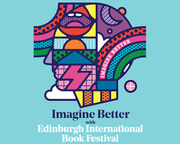
Imagine Better - Book Festival 2016 programme announced
Thu 09 June 2016
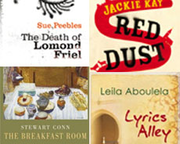
Scottish Book of the Year award: who wins? You decide
Fri 20 May 2011
- 2024 Festival:
- 10-25 August
- Full Programme launch:
- 4 June 2024
Latest News
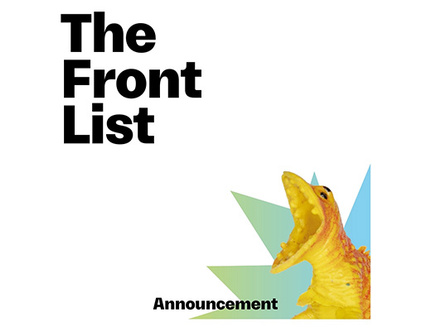 Book Festival reveals first author events for 2024
Book Festival reveals first author events for 2024

